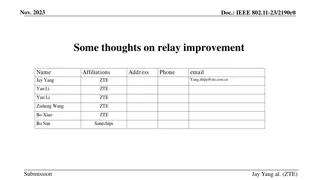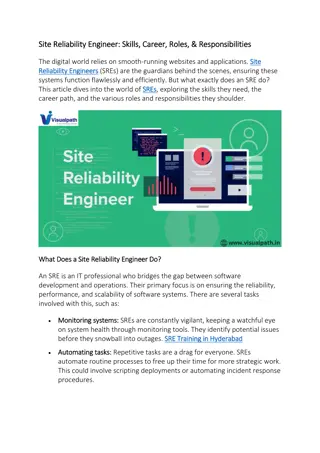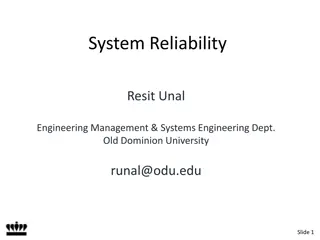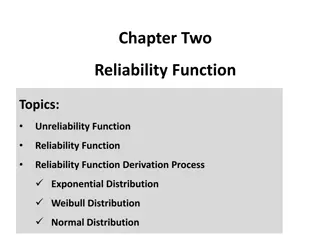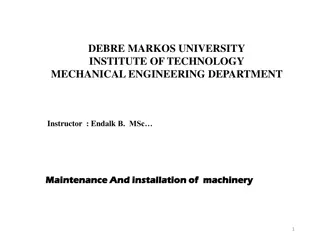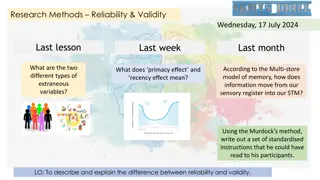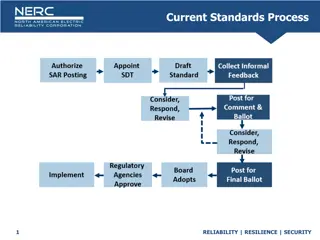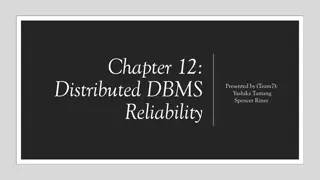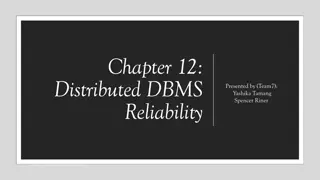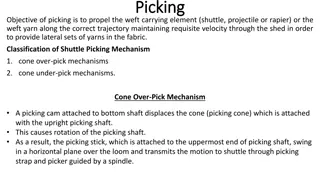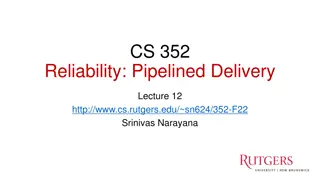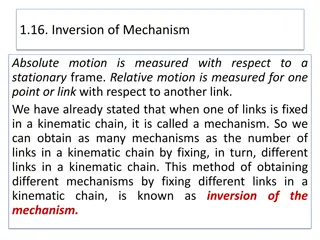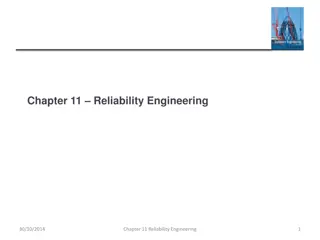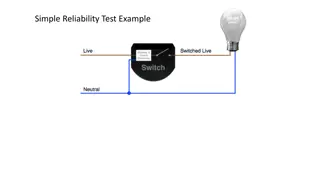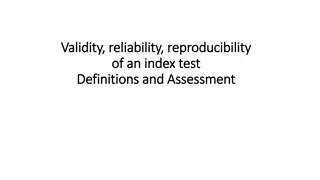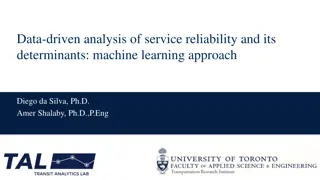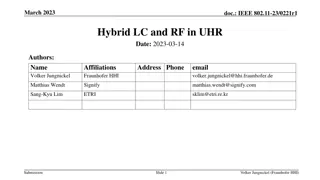Software Engineering and Architecture
Reliability in software systems is crucial, as defects can lead to failures impacting reliability. The number of defects directly affects the system's reliability. Not all defects are equal, so prioritizing defect correction based on return on investment is essential. Testing thoroughly, especially
1 views • 40 slides
Enhancing Wi-Fi Relay Networks for Improved Coverage and Reliability
This document discusses the need to enhance relay frameworks in Wi-Fi networks to improve coverage, reliability, and performance of stations in different ranges. It highlights the challenges of S1G-based relays, proposes enhancements to the relay framework, and introduces new types of relay framewor
1 views • 12 slides
Understanding Software Reliability Metrics
Software reliability is a vital aspect of system quality, ensuring that systems behave as expected and operate without frequent failures. Key concepts include fault, failure, and different time intervals like MTTF, MTTR, and MTBF. By measuring and understanding these metrics, we can assess the relia
1 views • 21 slides
DRRS Design to Meet HB1500 Intent
DRRS design aims to meet the requirements of HB1500 in determining the quantity of services needed for reliability standards in ERCOT grid operations. The primary goal is to ensure operational reliability during extreme events with a focus on dispatchable generation facilities. DRRS resources must b
0 views • 6 slides
Site Reliability Engineering Online Training | Hyderabad
Visualpath offers an effective Site Reliability Engineering Online Training Program. To schedule a free demo, simply reach out to us at 91-9989971070.\nVisit \/\/ \/site-reliability-engineering-sre-online-training-hyderabad.html\nWhatsApp: \/\/ \/catalog\/919989971070\/\n
0 views • 9 slides
Site Reliability Engineering Training Institute in Hyderabad - SRE
Visualpath provides the best SRE Training Course in Hyderabad by real-time experts we are providing a Site Reliability Engineering Course that is available globally in India, the USA, the UK, Canada, Dubai, and Australia To book a demo, please get in touch with us at 91-9989971070.\nVisit \/\/ \/si
2 views • 3 slides
Advancements in Chemical Mechanisms for Air Quality Management
Daniel Jacob and team have been enhancing chemical mechanisms in the GEOS-Chem model to support US air quality management. Ongoing work includes developing new mechanisms for aromatic VOCs, tropospheric halogens, mercury redox, adaptive mechanism reduction, machine learning applications, and unifica
0 views • 19 slides
Understanding System Reliability in Engineering
System Reliability in Science/Engineering involves understanding how products/systems work, as well as the ways they fail and the effects of failures. Reliability is the probability that a system will perform as expected under given conditions and play a crucial role in the design phase to mitigate
0 views • 19 slides
Understanding Reliability Functions in Data Analysis
Reliability functions play a crucial role in data analysis, providing insights into the probability of success or failure over time. This chapter delves into topics like unreliability functions, derivation processes for reliability functions using distributions like exponential, Weibull, and normal.
0 views • 19 slides
Understanding Reliability in Mechanical Engineering
Reliability in mechanical engineering pertains to the ability of a product to perform as expected over a specified period under defined operational conditions. This article delves into the factors influencing reliability, such as numerical value, intended function, product life, and operating condit
0 views • 61 slides
Reliability and Failure Analysis in Engineering Systems
Introduction to failure data analysis, goodness of fit testing, stress-strength modeling, and reliability evaluation in engineering systems. Learn about failure rate estimation, MTBF/MTTF calculations, and practical examples illustrating reliability metrics in industrial applications.
0 views • 27 slides
Understanding Plasmid Partitioning Mechanisms in Bacteria
The stable maintenance of low-copy-number plasmids in bacteria relies on partition mechanisms that ensure proper positioning during cell division. Different from high-copy-number plasmids, which rely on random diffusion, low-copy-number plasmids require regulated partitioning mechanisms to prevent d
0 views • 14 slides
Understanding Research Methods: Reliability and Validity in Psychological Studies
In psychological research, understanding reliability and validity is crucial. Reliability refers to consistency in measurements, while validity focuses on whether the results accurately represent the phenomenon being studied. Ensuring both reliability and validity enhances the credibility of researc
0 views • 13 slides
Current Standards Process for Reliability, Resilience, and Security
The current standards process focuses on ensuring reliability, resilience, and security in regulatory directives. It involves remanding standards to committees, convening technical conferences, re-ballingoting within 45 days, and considering input for further work. The process also covers the initia
1 views • 8 slides
Distributed DBMS Reliability Concepts and Measures
Distributed DBMS reliability is crucial for ensuring continuous user request processing despite system failures. This chapter delves into fundamental definitions, fault classifications, and types of faults like hard and soft failures in distributed systems. Understanding reliability concepts helps i
0 views • 58 slides
Distributed DBMS Reliability Overview
This chapter delves into the critical aspect of reliability in distributed database management systems (DBMS). It explores the concepts, measures, types of faults, and the significance of maintaining atomicity and durability properties of transactions in ensuring system reliability. The narrative hi
0 views • 51 slides
Understanding Shuttle Picking Mechanisms in Weaving
Shuttle picking mechanisms play a crucial role in propelling the weft carrying element to maintain the required trajectory and velocity in fabric weaving. Two common mechanisms are cone over-pick and cone under-pick, each offering unique adjustments for strength and timing. The cone over-pick involv
0 views • 14 slides
Understanding TCP Reliability and Pipelined Delivery
This lecture delves into the concepts of TCP reliability and pipelined data delivery, emphasizing the need for mechanisms to ensure data integrity and accuracy. It covers error detection, handling delayed and dropped packets, setting retransmission timeouts (RTO), coping with packet duplication and
0 views • 35 slides
Understanding the Inversion of Mechanisms in Kinematics
Inversion of Mechanisms in Kinematics involves measuring absolute and relative motions in stationary and moving frames, respectively. By fixing different links in a kinematic chain, we can obtain various mechanisms. This process does not alter relative motions but may significantly change absolute m
0 views • 78 slides
Jordan Atomic Energy Commission Human Reliability Program Overview
Explore the comprehensive Human Reliability Program implemented by the Jordan Atomic Energy Commission for the Research and Training Reactor facility. The program focuses on nuclear security, physical security, cyber security, and fostering a culture of reliability and trustworthiness among employee
5 views • 25 slides
Understanding Software Reliability Engineering Concepts
Explore the key topics of availability, reliability requirements, fault-tolerant architectures, and programming for reliability in software engineering. Learn about different types of faults, errors, and failures, along with strategies for fault management and avoidance to enhance software dependabi
0 views • 83 slides
Quick and Dirty Validation of GEFS Reforecast Calibrated Precipitation Forecasts
Validation of GEFS reforecast calibrated precipitation forecasts against NARR analyses, focusing on reliability, upper and lower tercile outcomes, and Brier skill scores for different lead times. Challenges with NARR analyses in capturing snowfall events in the northern Great Plains are discussed, s
0 views • 9 slides
Simple Reliability Test Example for Bulbs
Understanding reliability testing for bulbs involves testing failure rates, predicting longevity based on on/off cycles, and analyzing data to determine failure patterns. This example demonstrates collecting data, plotting results, fitting Normal curves, and using life distribution output profilers
0 views • 8 slides
Safeguarding Focal Point Training: Enhancing Reporting and Response Mechanisms
This training module focuses on empowering Safeguarding Focal Points (SFPs) to understand and implement community-based feedback and response mechanisms, effectively handle safeguarding complaints, document barriers to reporting, address data protection issues, and ensure inclusive and confidential
0 views • 18 slides
NERC Operating Committee Update & Strategic Plan Overview
The NERC Operating Committee (OC) oversees critical operational reliability matters within the electricity sector, aligning with the organization's strategic plan for the next five years. Led by Chair Jim Case and Vice-chair Lloyd Linke, the OC collaborates with various stakeholders, focusing on eme
0 views • 15 slides
Understanding Authentication Mechanisms and Security Vulnerabilities
Authentication lies at the core of application security, serving as the primary defense against malicious attacks. This article explores various authentication technologies, including HTML forms-based authentication, multi-factor mechanisms, client SSL certificates, and more. It delves into common d
0 views • 70 slides
Enhancing NAND Flash Memory Chip-Off Forensic Analysis Reliability
This study focuses on improving the reliability of chip-off forensic analysis of NAND flash memory devices. By identifying error sources, quantifying errors, and proposing mitigation processes, the research emphasizes the impact of storage time and heat on errors introduced in chip-off analysis. The
0 views • 26 slides
Understanding the Importance of Validity, Reliability, and Reproducibility in Clinical Measurements
Clinical practice involves measuring quantities to aid in diagnosis, predict patient outcomes, and serve as study endpoints. Errors in measurements can lead to inaccurate results and affect clinical decisions. Trueness and precision, accuracy, bias, and method comparison are essential concepts in as
0 views • 25 slides
Overview of Human Rights Monitoring Mechanisms
Human rights conventions under the United Nations and regional systems have established monitoring mechanisms to ensure compliance. These mechanisms include treaty-based and non-treaty-based approaches, with treaty bodies overseeing the implementation of legally binding instruments. Reporting proced
0 views • 23 slides
Improved Truthful Mechanisms for Subadditive Combinatorial Auctions
This research paper discusses strategies to maximize welfare in combinatorial auctions. It explores mechanisms for handling strategic bidders with private valuations, aiming to design truthful and optimal welfare mechanisms while considering polytime constraints. The study presents advancements in a
0 views • 19 slides
IEEE 2018 Emerging Technologies Reliability Roundtable Summary
The IEEE 2018 Emerging Technologies Reliability Roundtable took place in Austin, Texas, featuring speakers from various technology companies discussing topics such as software reliability, 5G network challenges, and ultra-reliability in wireless communication. The agenda included insightful talks, Q
0 views • 11 slides
ACE RAM Workshop - Barcelona 2019: Reliability and Maintenance Concepts
The ACE RAM Workshop conducted by George Pruteanu in Barcelona focused on topics such as RAM prediction, FMEA, maintenance concepts, preventive and predictive maintenance, condition monitoring systems, corrective maintenance, and design for maintenance. The workshop delved into reliability predictio
0 views • 16 slides
Machine Learning Approach for Analyzing Service Reliability Factors in São Paulo Transit Data
Explore how machine learning methods are applied to analyze São Paulo transit data, focusing on factors affecting bus service reliability measures. The study delves into quantifying and identifying relevant factors impacting service reliability across different levels such as stops, routes, and the
0 views • 10 slides
Understanding Reliability Theory in Engineering and Mathematics
Reliability theory, presented by S. Ithaya Ezhil Manna, explains the concept of reliability as the probability of a component functioning properly over time. The theory defines reliability in terms of the random variable X representing component life or time to failure. Key points include the defini
0 views • 22 slides
Understanding Biomarkers and Toxicity Mechanisms: Overview of Mechanisms in Targeting Biological Macromolecules
This overview delves into different categorizations of mechanisms of action (MoA) based on target molecules, interaction types, and steric specificity. It explores non-specific and specific mechanisms, along with possible categorizations involving membrane toxicity, reactive toxicity, and species-sp
0 views • 8 slides
Understanding Coping Skills and Defense Mechanisms
Coping mechanisms and defense mechanisms are strategies individuals use to manage stress and emotions. Coping mechanisms help people adjust to difficult events while maintaining emotional well-being, whereas defense mechanisms operate at an unconscious level and can change internal psychological sta
0 views • 18 slides
Defense Mechanisms in Psychology: Understanding Repression, Displacement, Intellectualization, Rationalization
Defense mechanisms play a crucial role in how individuals cope with stress and anxiety. This text delves into key defense mechanisms such as repression, displacement, intellectualization, and rationalization. These mechanisms help individuals manage unacceptable thoughts, feelings, and impulses by r
0 views • 11 slides
Understanding Steps in Heterogeneous Catalytic Reactions and Adsorption Mechanisms
This review discusses the steps involved in a heterogeneous catalytic reaction, focusing on diffusion, mass transfer, adsorption, and desorption processes. It details the site balance, surface reaction mechanisms, and desorption steps, providing insights into the complexities of catalytic processes.
0 views • 17 slides
Integration of Light Communications for Enhanced Reliability in Multilink Operations
The presentation discusses the integration of Light Communications (LC) into the Multilink Operation (MLO) framework to enhance reliability and reduce latency in wireless communications. By proposing the incorporation of LC as a new offloading opportunity within the MLO framework, the potential for
0 views • 15 slides
Understanding Reliability Measures in Research Supervised by Dr. Mohammed Mahdi Sharifi
Reliability is crucial for assessing the consistency of metrics in research. Various methods such as inter-rater reliability, test-retest reliability, parallel forms reliability, and internal consistency reliability help ensure the dependability of research findings. By examining factors like judgme
0 views • 9 slides

